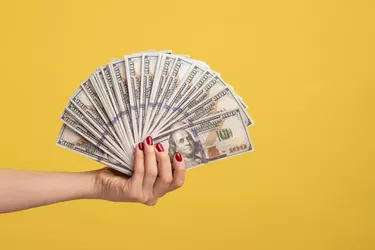
A check isn't considered cash unless and until you do something with it. It can produce a cash payment, either as paper dollars in your hand or as an amount that will be credited to your bank account. The ease of the process depends on who the check is made out to and what type of check it is. A cashier's check, certified check or money order tends to be much easier to cash than a personal check or a business check.
Check Made Out to Cash
Video of the Day
The "pay to the order of" line on the check might be left blank (although this is rare) or it may bear the single word "cash." The latter is the closest a paper check will ever come to being considered cash. That single word means that it can be cashed by anyone who has possession of it.
Video of the Day
Some states and locations treat a blank line the same way, such as the District of Columbia. But you won't want to count on this. Ask the issuer of the check to enter something on this line, designated as "3" on our image: either your name or the word "cash."
Turning a Check Into Cash
Your best shot at getting cash for a check is to take it to a branch of the bank it's drawn on. The name of the bank should be printed on the bottom left side of the check, but not all banks advertise themselves this way. You'll have to do some detective work if nothing appears here.
Look up the bank's routing number online. This is the first series of nine digits at the left side of the very bottom of the check, just to the left of the account number.
Assuming the check is made out to you, the Consumer Financial Protection Bureau warns that you'll almost certainly have to provide ID proving that you're the individual whose name appears there if the check isn't made out to cash. You'll have to endorse it, signing your name on the back exactly as it appears on that payee line.
Other Options for Getting Cash
You still have some options if you can't identify the bank the check is drawn on or if the financial institution doesn't have a local branch in your area. You can try taking it to your own bank, but it may require that you deposit the check to your checking account or savings account rather than cash it.
At the very least, it will give you cash for the face value of the check, but it will put a hold for that amount on a portion of your checking account balance until the check clears. You can also spend the money via a debit card as soon as the check clears. This process can take one to three business days, depending on your bank.
Or, try cashing the check at a retail store. Some grocery stores and discount department stores provide this service, but again, you'll need an ID. Think Walmart and Food Lion.
Beware Check Cashing Stores
Finally, you might consider taking the check to a check cashing store. These operations exist almost entirely for the purpose of turning paper checks into cash.
One of the downsides of this option is that you'll almost certainly pay a fee. These places are in business to make money, after all. Let's say you want to cash a check for $100 and the storefront service charges $5 for cashing a check in this amount. You'll present the check, endorse it, provide ID and walk out of the store with $95.
The fee can range from 1 percent to 12 percent of the check, according to InCharge Debt Solutions. The average is 4.1 percent, and the exact amount can vary by state.
Your Timing Matters
You don't have forever to exercise any of these options. The Consumer Financial Protection Bureau warns that checks become "stale" six months after they're dated at the top on the right side. Federal law doesn't require that financial institutions must cash checks after this time, or even deposit them, although individual states can have varying rules and laws.
- Consumer Financial Protection Bureau: Can I Cash a Check at Any Bank or Credit Union?
- Consumer Financial Protection Bureau: The Bank/Credit Union Refused to Cash a Check Because It Was More Than Six Months Old. Is This Allowed?
- Mehoopany Employees Federal Credit Union: Check Writing 101
- Council of the District of Columbia: Code of the District of Columbia § 28:3–109. Payable to Bearer or to Order
- InCharge Debt Solutions.org: What Is Check Cashing?
- The Free Legal Dictionary: Cashier's Check